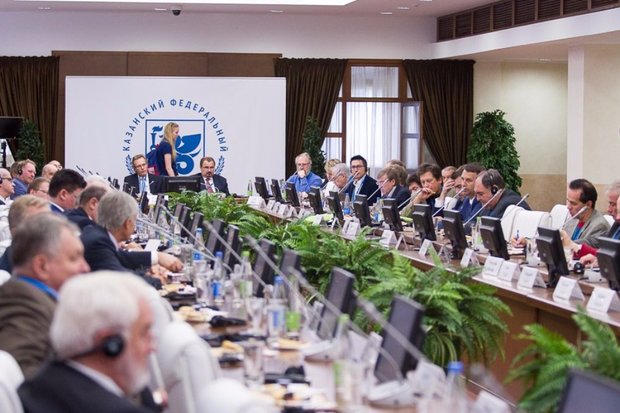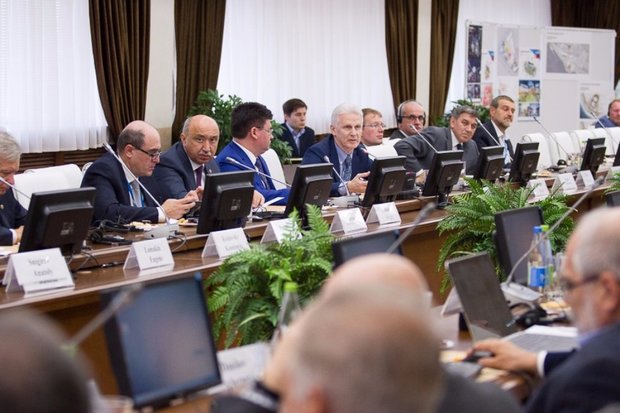Andrey Fursenko: ‘It is better to help everyone but the extensive development of science in the world ended 30 years ago’
On 20 September, the Aide to the President of Russia Andrey Fursenko gathered within the walls of the Kazan federal University the round table discussion with the participants of the program of mega-grants, in the scope of which the scientists from all over Russia receive funding for the opening and operation of own laboratories in different scientific fields. Thus, the government of the Russian Federation from 2010 is trying to support and develop domestic science and to stimulate scientific developments. The correspondent of Realnoe Vremya attended the discussion and found out what, according to Fursenko, it is possible to sacrifice for the development of science and what changes to the program its participants would make.
The scientists together with Fursenko sat at the 'round table'
Within the scope of the II International Scientific Conference 'The science of the future' in Kazan Federal University it was held a round table discussion of the recipients of mega grant with the presidential aide of the Russian Federation Andrey Fursenko to discuss further stages in the development of the domestic science and necessary conditions for this. The former Minister of education of the Russian Federation proposed the scientist to express their opinions, noting that he has his own one but would announce it later in the course of the discussion.
In the meeting room of the Board of Trustees of the Kazan Federal University almost none of the participants of the round table discussion introduced themselves. Apparently, they knew each other very well. Scientists spoke about the needs in education, social demands, in which the science needs to figure out. As an example, the most acute of demands was the diseases and viruses that quickly mutate into new forms and represent new threats for people. Someone suggested that the lack of global projects in science affects not in the best way and it is very important the scientists, working in even theoretical physics, had the global tasks — for example, an industrial project which would be invested with funds. In this case, according to one of the experts in the field of aircraft engineering, the global projects in this area will involve not only applied science but also fundamental one.

Separately, the question was raised concerning the scientific staff, which at the moment is not enough. Vladimir Spokoiniy, a recipient of the mega grant, is sure that without functioning scientific schools we cannot move forward, and a few years to create are not enough — it requires much more time. And the period, which under the program of mega-grants was allocated an extremely large amount (the first years of its work — from 2011 to 2013) is insufficient. As an example, the scientist cited Germany, where the establishment of scientific personnel in the spotlight. Fursenko replied that in Germany at the certain programs they come up with stringent requirements, and, in case of noncompliance they close not only a laboratory but also the whole institution.
'We should make choice'
The invited guest from Italy, in his turn, spoke about the struggle with bureaucracy in Russia and the need to focus on science. Besides, he suggested to improve the megagrant program to attract participants and to develop science. The Aide to the President of the Russian Federation responded to that.
'I want to say that there is a conflict of interests. With limited resources we should understand who to give preference. It is better, of course, to help everyone, but the extensive development of science in the world ended 30 years ago. In the Soviet Union, by the way, we were a little behind, but also came to the conclusion that the problem requires redistribution, which implies stricter requirements. This means that the continuation of the work is possible only if what you show is not the same results that you had 2-4 years ago but better.'

Andrey Fursenko: 'When we say that we should support the schools, people in a long-term – in the first place, we should tell what school we should not support before we say what schools we should support.'
According to Fursenko, otherwise we should give a chance to those who have a high potential. 'We should make a choice. When we say that we should support the schools, people in a long-term – in the first place, we should tell what school we should not support before we say what schools we should support.' According to him, it is the academic community, not the officials, who should make such decision.
As for the program of mega grants, which implies the allocation of funds to create scientific laboratories all over Russia, there were different opinions. Someone believes that amid current economic conditions the support of the labs in the universities in the scope of mega grants program should be expanded from three to ten years on the basis of a competitive selection. The others believe that the financing should be carried out incrementally depending on labs' performance. Still others expressed completely different opinion – after three years of operation the labs should enter self-financing and self-supportability, and the budget fund should be spent for other purposes. Finishing the round-table discussion, Fursenko promised to consider all received information.